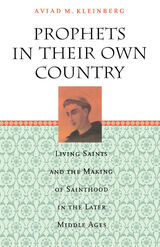
In the fourth century a new narrative genre captured the imagination of the faithful—the moving accounts of the lives of Christian saints. Willing to die gruesome deaths or endure constant suffering, saints conveyed a powerful message: God was still present in the world. He continues to manifest His powers and communicate His messages through His special friends—the saints. What kind of Christianity do we find in these stories? In this original and provocative work, Aviad Kleinberg argues that the saints’ stories of medieval Europe were more than edifying entertainment; they retain an alternative theology, often quite different from the formal theology of the Church. By telling and retelling the story of virtue and salvation, by expanding the religious imagination of the West, they were shaping and reshaping Christianity itself.
In this study of stories from the fourth through the fourteenth centuries, we meet the tender Perpetua bidding farewell to her infant son, Simeon Stylites turning himself into a rotting corpse, Francis of Assisi finding joy in suffering, and Fra Ginepro playing the fool, for Christ. We meet holy anchorites, headstrong virgins, fearless dragon slayers, and scheming politicians. Kleinberg unveils the inner contradictions, the subversive ideas, and the deadly power games that lay behind the making of the Western imagination. People, ideas, and passions—often relegated to the back pews—take center stage in this daring book. This is a story of how stories change lives.

"[A] fascinating and sometimes iconoclastic view of saints in the medieval period." —Sandra R. O'Neal, Theological Studies
"[An] important new book. . . . [And] an excellent piece of scholarship." —Diane L. Mockridge, Method & Theory in the Study of Religion
"[Kleinberg's] style is clear and accessible and his observations insightful; the book is a pleasure to read." —Veronica Lawrence, Theological Book Review
"Original and interesting. . . . [Kleinberg] has made a major contribution." —Anne L. Clark, American Historical Review
"Kleinberg's concern is not just with perceptions of sanctity, but, refreshingly, with what actually happened: and he is especially good on the conflict of the two. . . . [This] is not just a book but a way of thought, and one that promises interesting conversations at all levels from the church porch to the tutorial and the academic conference." —Helen Cooper, Times Literary Supplement

There is no society without right and wrong. There is no society without sin. But every culture has its own favorite list of trespasses. Perhaps the most influential of these was drawn up by the Church in late antiquity: the Seven Deadly Sins. Pride, sloth, gluttony, envy, anger, lust, and greed are not forbidden acts but the passions that lead us into temptation. Aviad Kleinberg, one of the most prominent public intellectuals in Israel, examines the arts of sinning and of finger pointing. What is wrong with a little sloth? Where would haute cuisine be without gluttony? Where would we all be without our parents’ lust? Has anger really gone out of style in the West? Can consumer culture survive without envy and greed? And with all humility, why shouldn’t we be proud?
With intellectual insight and deadpan humor, Kleinberg deftly guides the reader through Jewish, Christian, and Greco-Roman thoughts on sin. Each chapter weaves the past into the present and examines unchanging human passions and the deep cultural shifts in the way we make sense of them. Seven Deadly Sins is a compassionate, original, and witty look at the stuff that makes us human.
READERS
Browse our collection.
PUBLISHERS
See BiblioVault's publisher services.
STUDENT SERVICES
Files for college accessibility offices.
UChicago Accessibility Resources
home | accessibility | search | about | contact us
BiblioVault ® 2001 - 2024
The University of Chicago Press









